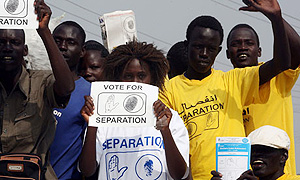The whole week has seen the week-long referendum in South Sudan eating up so much media space whether it is newspaper column inches or airtime on radio and TV. The internet with its ubiquitous blog, Facebook and twitter sub-cultures has not been spared either.


The whole week has seen the week-long referendum in South Sudan eating up so much media space whether it is newspaper column inches or airtime on radio and TV. The internet with its ubiquitous blog, Facebook and twitter sub-cultures has not been spared either.
Even the attempted assassination of US congresswoman, Democrat Gabrielle Giffords in Tuscon, Arizona as well the riots in Tunisia have all not been able to snatch the limelight away from events in Southern Sudan.
After decades of war, segregation and untold misery the Southern Sudanese are on the brink of achieving self determination. It is very unlikely for the results to turn out in favour of unity with the Arab North and after a short spell of autonomy; the birth of a new South Sudan is kind of a foregone conclusion.
The larger East African Community, surely, has a large stake in the outcome of the South Sudan referendum, even much more than the cheap-fame-seeking celebrities who have camped in Juba. Of course China and the US are also hoping to settle their turf wars for the oil fortunes.
EAC has bore the heaviest brunt of the problems in Southern Sudan over the years. Kenya and Uganda which share a large border with Sudan have had to share resources with thousands of refugees fleeing the skirmishes between the Khartoum and Juba power centres.
To make things worse, Northern Uganda had to endure a 20-year long senseless rebellion by the self styled Joseph Kony and his Lord’s Resistance Army rebel group. This group received substantial support from the Khartoum government which accused the government of Uganda for supporting the Sudan People’s Liberation Movement/Army that was led by Dr. John Garang.
Rwanda was also drafted into the equation when it contributed troops to the peace keeping mission charged with restoring order in the volatile Darfur region. So far the Rwanda troops have done such a commendable job, and that is why the region is no longer making negative headlines.
After the signing of the Comprehensive Peace Agreement in Nairobi, life gradually eased back into the region and within no time, the autonomous South found their Southern neighbours Uganda and Kenya to be very crucial trade and development partners.
Regional airlines started flying to Juba, and the numerous cross border buses added Juba to their route maps. The common street talk between traders soon became incomplete without mentioning Juba along names like Dubai and China as trade spots with lots of opportunities.
Large regional businesses like Kenyan banks and construction firms quickly opened branches in South Sudan. The strong and lucrative trade ties that South Sudan has forged with EAC especially Uganda and Kenya have fuelled talk of having the country join the EAC soon after separation.
EAC investors easily salivate when South Sudan is mentioned, and they cannot wait for it to break off as they hope this will further ease relations. For example, Kenya’s giant bank KCB which already has several branches in South Sudan, has announced plans to open 30 more branches in the event that the referendum favours separation.
By helping South Sudan find its feet as a new state, EAC stands to grow immensely as a regional trade bloc. It is this possibility that compels EAC to watch the referendum as if they were Sudanese citizens too.
However, a few things will have to change if at all the relationship between the EAC and South Sudan is to improve after the referendum. Reports of Ugandan and Kenyan traders being killed should be addressed. To do this, the government of South Sudan should do a better job at disarming the heavily armed civilian population. The deaths certainly scare off investment and need to be curbed.
The EAC as a whole should also invest in infrastructural development to ease trade with the South Sudan. The major roads into Sudan from Uganda and Kenya, need to be widened and tarmarked, to ease the transportation of goods across the borders. More importantly the region should fast track the construction of a railway link connecting Juba to Mombasa and may be Kampala.
Considering that Southern Sudan is blessed with vast oil wells, it would certainly be a smart move for Kenya to construct a pipeline that transports Sudan oil to the Kenyan coast. Of course there are already existing pipelines taking the oil through Northern Sudan but it may be in the best interests for Sudan to have a Southern back up plan.
As we pray for the referendum to conclude smoothly, and for there not to be a violent aftermath, we need to strategise as a region as to how best to trade with South Sudan even before we consider its admission into the EAC family.


